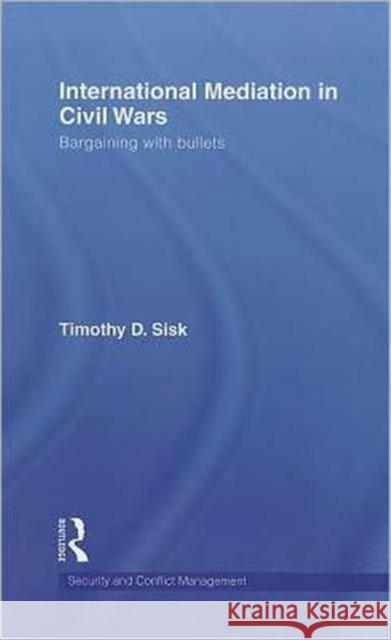International Mediation in Civil Wars : Bargaining with Bullets » książka
International Mediation in Civil Wars : Bargaining with Bullets
ISBN-13: 9780415477055 / Angielski / Twarda / 2009 / 253 str.
International Mediation in Civil Wars : Bargaining with Bullets
ISBN-13: 9780415477055 / Angielski / Twarda / 2009 / 253 str.
(netto: 740,24 VAT: 5%)
Najniższa cena z 30 dni: 705,23
ok. 16-18 dni roboczych.
Darmowa dostawa!
This book provides a framework for the study of peace negotiations as a bargaining problem, and explores how international mediation can be more effectively designed and practised to enhance the prospects for ending civil wars.
Intra-state violence, and its transnational effects, is the most significant threat to international peace in the post-Cold War era. This book provides a theoretically informed framework to the study of peace negotiations as a bargaining problem.
Although much scholarship addresses overall outcome patterns of war termination, there is insufficient understanding of the processes of de-escalation; understanding more fully the steps and sequences of how wars end today is critical to improving the slowly but steadily evolving system of international responses to war through 'peacemaking'. Peace processes are inherently complex because often violence increases as talks begin, rather than diminishing. This book investigates the effects of political violence settlement negotiations, and explores how international mediation can be more effectively designed and practiced to enhance the prospects for ending civil wars through comprehensive negotiated settlements. The methodology features a structured, focused comparison of five cases: South Africa, Liberia, Burundi, Sri Lanka, and Kashmir. These cases are placed within a context of a much larger set of peace negotiations in more than a hundred other conflicts that have occurred after the fall of the Berlin Wall; the lion’s share of protracted armed conflicts today end in negotiated peace agreements.
Through a better understanding of the dynamics of peace process, the book concludes with findings and recommendations for international mediators to prevent the escalation of violence and to advance comprehensive settlement in protracted wars. In sum, the book argues for assertive and indeed coercive mediation by the international community to stop the killing in contemporary wars. Rather than "give war a chance" in the hope that a definitive victory for one side will lead to a more sustainable peace (an unconvincing finding that some have argued), this books shows that determined, focused, bold and sometimes muscular mediation by the international community offers the best hope for ending the untold sorrow that contemporary civil wars inflict on societies and the perils they pose for international peace and security.
This book will be of much interest to students of conflict management, internal wars, civil wars, international security and IR in general.











